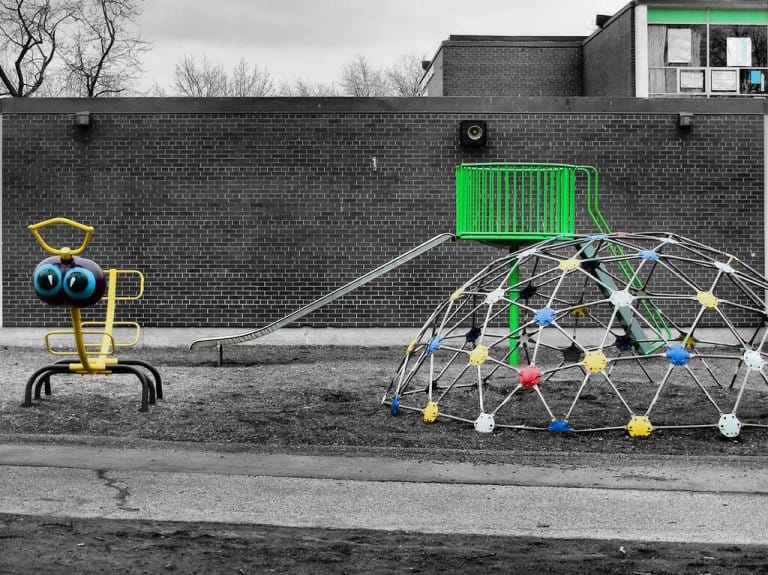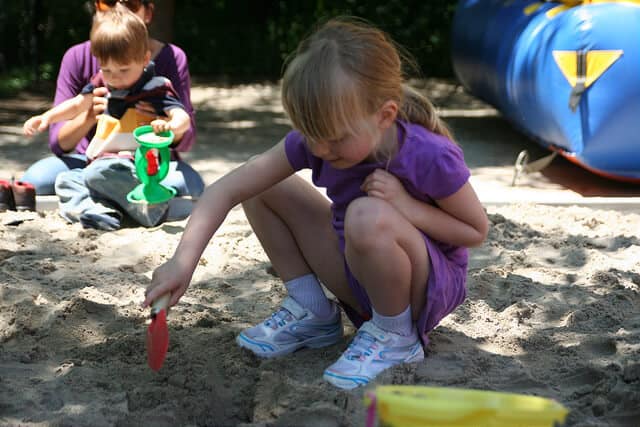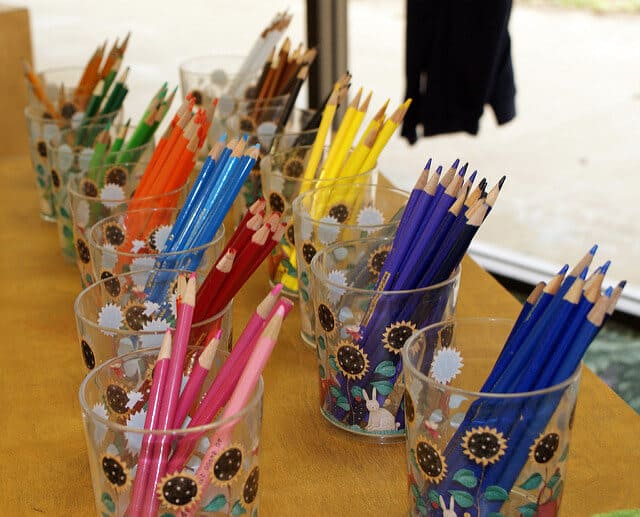13 Alternatives to Public School: Choices in non-public education

Back when you attended kindergarten or preschool, school choice wasn’t much of a choice for your parents, and the options were probably straightforward. Today, education is an extremely complex question that rightfully deserves its place in major national dialogue. Newspapers, blogs, coffee shop discussions, and political conversations regularly debate curriculum, school quality, educational funding, educational theory, teacher quality, and funding.
If you are a parent who has suddenly become concerned about what your children are learning in public school, you aren't alone. If you have no idea what your children are learning in public school, you're also among fine company. If you're a new parent and your children are nearing kindergarten or preschool, and you want to know your options, you're also not alone. Every year more and more parents are becoming curious about the available options for education.
No, public school is not your only option.

Alternatives to Public School Education
There are different laws by state that govern the process for keeping a child out of the public school systems. However, every single state has some provision for alternative schooling. The rest of this article will briefly discuss (essentially) every possible alternative to public schools.
Private school
Private school is the most popular alternative to public school. Right now, there are about 5 million students who attend private schools in the United States. There are a myriad of reasons why parents choose private schools. These reasons are often the same for many other public school alternatives. These reasons include, but aren't limited to religion, single-sex education, and scheduling needs.
Private schools are independently funded which means the student's parents/legal guardians are responsible for financing the education cost. This price will include tuition and any other facility fees, gear, and extra-curricular activities. In return, the independently funded private school can create their own curriculum, standards, grading scales, and school trips. The school has full control over spending and allocation of funds.
The school can also choose what teachers to hire, how to handle special needs children, set a maximum class size, and arrange special admissions requirements. Single-sex education is a possibility in a private school because the private school can set any gender requirements they wish.
Without stating too many generalizations, almost all private schools have smaller class sizes. Research data also shows they are more likely to be accepting of students who were bullied in public schools and students with diverse religious, cultural, and religious backgrounds.
Private religious schools

It is worth making a distinction between private religious schools and secular private schools. Secular is sometimes confused with being anti-religious, although this is simply not the case.
Private institutions are frequently married to some form of church or religion. For example, there are Catholic schools, Friends schools, Jewish day schools, National Christian schools, Seventh Day Adventist schools, Episcopal schools, Evangelical schools, and many more.
These private religious schools keep traditions and family values alive.
Boarding school
Boarding schools are private schools with required or available dormitories on the school's campus. These residential private schools provide meals, shared dormitories, rigid rules, and classes for their students.
Most of the time these schools follow very strict schedules and structured days. Student's weekly routines are predetermined with classes, study time, activities, meals, and often sports. Although the student's day is usually very inflexible, these schools are said to produce students that are highly independent.
This is not an ideal option for parents that want to be more involved in their child's education, but it is unquestionably a unique and very different alternative to public school.
Charter schools
Sometimes people think charter schools and private schools are essentially the same things. This is not the case because charter schools receive public (government) money.
However, unlike public schools, they are exempt from some of the rules, statutes, regulations, and requirements that apply to public schools.
As an alternative to public school, you might naturally assume that charter schools require some amount of funding or tuition from their pupils. This is not the case! In fact, because they are part of the public education system they cannot legally charge any money for tuition.
There are not enough charter schools to fulfill the demand. Therefore, virtually all charter schools (virtual and brick-and-mortar) operate on a lottery ticket admissions system. The luck of the draw students are admitted, and all others are forced to look elsewhere. So, start planning ahead and have a backup plan.
To date, there are more than 4,000 charter schools.
Magnet schools

This is a type of public school that specializes in an area of expertise. There are over 4,500 across the United States and often draw students from a very wide geographic area. Because magnet schools focus on a school theme (a particular interest like STEM or fine arts), they admit a broad assortment of students.
You can expect a magnet school to emphasize a “hands on – minds on” learning approach that applauds inquiry and project based learning. Parents wishing to escape Common Core standards entirely might not be happy that these schools often abide by SCSS standards. A magnet school will either use the state, district, or SCSS standards for all areas of study.
Just like charter schools, admissions are competitive and are usually done through a random lottery.
Military school
Most military schools start at the high school level, therefore not an option for students below 9th grade. The schools are designed, in the United States, to prepare their pupils for the armed service. There are many free military high schools available.
Online Schools
There are public and private online schools as well as online charter schools and online homeschool programs.
Online public and private schools
These follow the same logical benefits and/or restrictions that an in-person public and private school would follow. Online public schools are free, while online private schools are not. Online public schools adhere to state standards, while online private schools can create custom curriculum or offer multiple learning paths.
There is incredible variety among online private schools. Some are fairly regimented while others offer customization, individualization, and assistance.
Homeschooling
Homeschooling has grown exponentially in the past 10 years. While most of the population does not consider it "mainstream," it has come a long way from what used to be considered an educational fringe group.
 Homeschooling is legal in every single state in the United States, as well as many foreign countries like the United Kingdom, South Africa, Australia, and more.
Homeschooling is legal in every single state in the United States, as well as many foreign countries like the United Kingdom, South Africa, Australia, and more.
It is best to think of homeschooling like an umbrella. There are many methods and styles of homeschooling. These approaches can look starkly different.
For instance, some parents want full control over their children's curriculum and pick and choose text books, books, videos, lesson plans, and other materials for each subject. Other parents choose box curriculum that takes care of a full year of education. Parents with many children often use unit studies that can be modified to accommodate multiple children at the same time. Other homeschooling parents use an online curriculum to lessen the burden of teaching, grading, and tracking their children's progress.
The majority of parents who choose to homeschool do so because they want to be more involved in their child's education. There are as many reasons for homeschooling as there are styles of homeschooling. While some parents may want more control, others believe the traditional school systems have failed their children. Parents of children with behavioral issues often disagree with the discipline style and the lack of accommodation in public schools.
Click here to find out how to get started.
Unschooling
Some would say this doesn't deserve its own heading and should simply fall under the homeschooling umbrella. Others will say this is a distinctly different style of education.
Although several styles of homeschooling bleed into the territory of unschooling, what really sets it apart is a complete abandonment of set curriculum. Unschoolers use no curriculum, follow no standards, required 0 textbooks, don't measure progress with tests (well, many states require some type of end-of-the-year testing), and sometimes never even create a rough schedule.
Learning is interest driven and child-directed. There is a great emphasis on real life experiences. There isn't space in this article to fully explain Unschooling, but you can click here for a full explanation and more information.
Parents with large amounts of free time to devote to their child's education and early development can thrive as unschoolers.
Montessori

Wouldn't it be nice if students were free to explore interests and lessons that they are most interested in or value the most? Wouldn't it be nice if you could remove the competition and grade comparisons that are often rampant in private schools and the top percent of students in public schools?
If this peaks your interest, a Montessori school might be an option worth considering...
Montessori schools follow Dr. Maria Montessori's theory that self-directed learning is the best method to educate students.
But wait, does it work?
Well, it worked for both cofounders of Google, Larry Page and Sergey Brin, among many others.
Waldorf
Waldorf schools are philosophically rooted in Rudolph Steiner's theory of education. (You'll also hear Waldorf used as the name for a style of homeschooling.)
Do you believe that imagination should be emphasized in learning? Do you think that the intellect, pragmatism, and arts should be combined in education? If so you might want to read more about Waldorf education.
Waldorf education intends to awake the physical, behavioral, emotional, cognitive, social, and spiritual facets of every individual during the education process.
The development of pupils is broken into three stages, each lasting around seven years. The stages are early childhood education, elementary education, and secondary education. Early childhood education focuses on hands-on activities, creative play, and other practical activities. Elementary education emphasizes artistic expression and social capacities. The third and final stage, secondary education, is concerned with developing critical reasoning and empathy.
You will find over 150 of these schools in North America, 730 schools in Europe, and fast growing numbers in Asia and South America. If this piqued your interest, you'd enjoy reading more because this section barely scratches the surface.
Core knowledge
Have you heard talk of cultural literacy? Cultural literacy is the big "buzz word" of the core knowledge curriculum which heavily promotes knowledge in conjunction with the community. The Core Knowledge Foundation is an independent, nonprofit organization that was founded in 1986.
The school's mission is to create literate citizens who will contribute to a democratic society, empower students to achieve their greatest academic potential, shrink the gap of high achievement & excellence among American students, and provide equity in education.
Country day school
If you've never heard of a "Country day school," you are in good company. However, you may be surprised to learn that the first country day school opened its doors in 1917, and there were country day school predecessors in the late 1800s.
A quick rundown of their philosophy: The schools aspire to foster the best in early childhood education with an emphasis on developing a child's pleasure for learning, physical and mental awareness, and problem-solving abilities. Out of doors activities are incredibly important to the schools. Their curriculum regularly integrates and utilizes unit studies. Learn more about the country day school movement here.







Leave a Reply